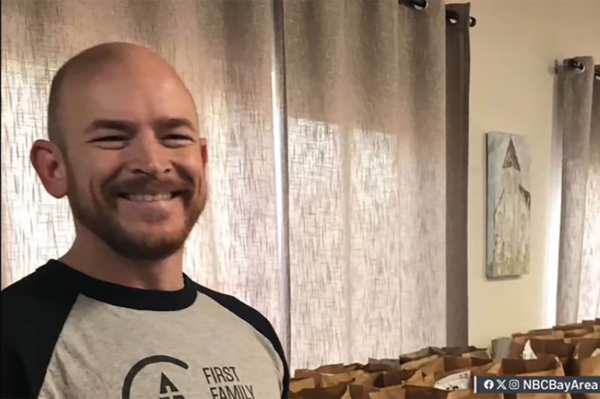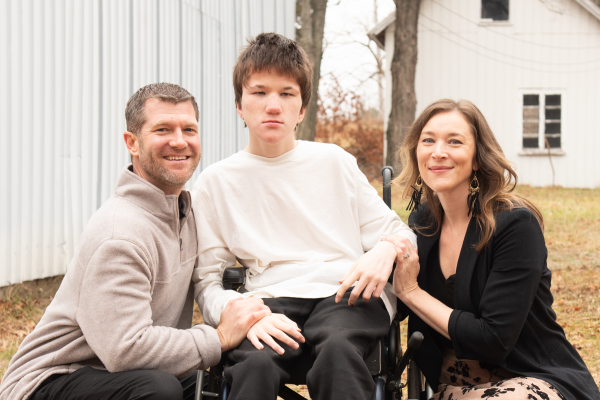8 Biblical Steps to Recover From Post Traumatic Stress Disorder
Omar Gonzalez scaled a fence and sprinted more than 70 yards across the North Lawn of the White House to deliver a message to President Obama: "the atmosphere is collapsing" and he had critical information for the President to pass on to the American people.

But the truth is Gonzalez's world was falling apart.
Armed with a knife, the Iraq war veteran landed at the front double doors of the North Portico, turned a brass doorknob and dashed inside the home of the most powerful man in the world. After overpowering a guard, Gonzalez was eventually subdued at the end of a long chamber in the White House, making it a security breach that is the first of its kind.
One of the most sympathetic voices for a war veteran whose world has tragically gone awry is Gonzalez's ex-wife, Samantha Bell. She doesn't believe that Gonzalez would have hurt the President, but she's known for a long time that he has struggled with Post Traumatic Stress Disorder (PTSD).
"I wish there was something I could have done to help him …" she laments. "He needs to get treatment, I think he needs to get proper help – throwing him in a jail is not helping him."
Bell says something catastrophic occurred on Gonzalez's second tour in Iraq, an incident so painful he refused to talk about it, except one time: "It was terrible," he recalled. "Sam, the only thing I can tell you is it involved little children."
One of the most grievous heartaches we face as a nation is how to best serve those who have served our country. Soldiers often return home with battle scars. Some are physical and visible, but many are unseen – emotional, mental and spiritual wounds that require time and care to heal. For many like Omar Gonzalez, past pain has a stranglehold on their present-day psyche, choking off vitality, joy and the hope of a better tomorrow. PTSD eerily shadows all of life and swallows up the most vulnerable.
If you or someone you care about is struggling with PTSD, please know there are people who truly care and sincerely want to help. They are specially trained to lead you on the road to full recovery. Never forget that there is a God who loves you unconditionally. He is fully capable and eager to steer you down that road … and into His arms.
Find help today, and begin by considering eight steps to recover from PTSD.
1. Acknowledge the reality of your trauma. Admit to yourself, to God and to at least one other person that you are hurting and in need of healing. Identify the symptoms you are experiencing, their frequency and their impact on your life.
"Trust in him at all times, you people; pour out your hearts to him, for God is our refuge" (Psalm 62:8).
2. Recognize the source of your trauma. Explore and discover the source of your pain, then share what you experienced with a trusted, mature friend. Explore subsequent experiences that have been spin-offs or repercussions from your original trauma.
"Wisdom is a shelter … Wisdom preserves those who have it" (Ecclesiastes 7:12).
3. Seek counseling for severe symptoms. Process flashbacks, dreams, nightmares and other troubling experiences with a trained professional. Inform a medical doctor if depression becomes severe or chronic.
"The prudent see danger and take refuge, but the simple keep going and pay the penalty" (Proverbs 22:3).
4. Realize present situations can trigger buried memories and more emotional pain. Sights, sounds, smells, touch, etc. can all prompt emotional and physical reminders of past pain. Be increasingly cognizant of your personal "triggers."
"Those who suffer he delivers in their suffering; he speaks to them in their affliction" (Job 36:15).
5. Commit to journaling as you travel on the road to recovery. Recording thoughts, feelings, insights and breakthroughs are invaluable markers for monitoring the healing process. Reading your journal provides encouragement and becomes "your story" on paper, a testimony perhaps you can share one day with someone who is hurting.
"Go now, write it on a tablet for them, inscribe it on a scroll, that for the days to come it may be an everlasting witness" (Isaiah 30:8).
6. Examine self-injurious thinking or behavioral patterns. Honestly evaluate how negative thoughts are resulting in negative behavior, and deliberately replace them with loving, encouraging thoughts based on God's heart for you. Pinpoint ways you could be sabotaging yourself professionally or personally and explore the reasons why with a person who understands PTSD.
"We all, like sheep, have gone astray, each of us has turned to our own way; and the LORD has laid on him the iniquity of us all" (Isaiah 53:6).
7. Investigate emotional and psychological walls you have erected and self-protective tools you have employed. Enlist close family and friends to help you consider the illegitimate ways you have tried to meet your God-given needs for love, significance and security. Explore all defense mechanisms designed to keep relationships superficial or separate from your past traumas (isolation, anger, critical spirit, etc.).
"Nothing in all creation is hidden from God's sight. Everything is uncovered and laid bare before the eyes of him to whom we must give account" (Hebrews 4:13).
8. Find freedom from the bondage of past pain and begin anew. Dealing with painful experiences is painful, but it is critical to healing and to the hope of a promising future. Pain held captive in silence is pain never freed. Remember that pain expressed is pain released.
"Then you will know the truth, and the truth will set you free" (John 8:32).
My heart goes out to Omar Gonzalez and other men and women like him. Soldiers are known for enduring suffering and hardship. Paul even encouraged Christians to "endure suffering along with me, as a good soldier of Christ Jesus" (2 Timothy 2:3 NLT). But soldiers never need to suffer alone. If you are suffering from wounds hidden deep in your soul, reach out to someone who can help. For all of us who enjoy the benefits of freedom, let us commit to serve those who have selflessly served our country.






















